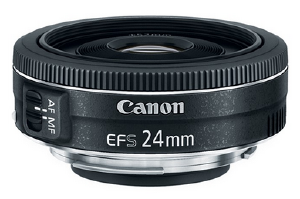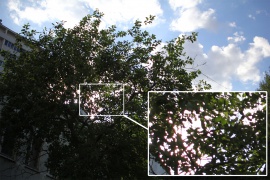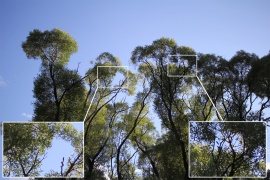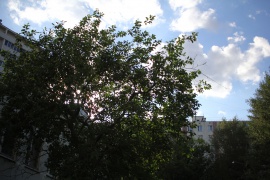Canon EF-S 24mm f/2.8 STM
The Canon EF-S 24mm f/2.8 STM is a compact, wide-range, fixed focal length lens for Canon digital single-lens reflex cameras.
The lens construction has a system for smooth, quiet focusing, allowing for the creation of videos without noticeable noise using the auto-focus system. An optimized lens mechanism reduces flares and chromatic aberrations in images. Its small focal length allows for macro shots to be taken from a minimum distance of 16 cm. The price of the lens varies from 170 US dollars, making it a budget lens.
Feel free to discuss this lens, ask questions about its usage, and post all messages related to the topic on the discussion page of the article.
Lens usage
Advantages
The most important advantages of this lens are as follows: Compact size and weight - you can have the camera in small bags, cases, and backpacks due to the lens size and the total weight of the camera with the lens allows for it to be taken on long trips by foot; the maximum aperture size - because of the sufficiently large aperture size (f2.8), the lens allows for high-quality images to be taken in dark rooms or at night without a flash and the need to fix the camera on a tripod; a metal bayonet allows for the lens to be securely attached to the camera, making the entire structure resistant and durable; a justified ratio of price and quality - this budget lens produces photos with good quality, such as sharp and clear images; suitable for full-frame and non full-frame cameras; and an excellent lens for panoramic shooting.
Disadvantages
The disadvantages of the lens include the following:
Lens distortion - this effect is difficult to detect on images made with this lens. If there is a distortion, it can be easily corrected with special programs for image editing;
Slow auto focus in dark conditions - the auto focus speed of the lens is often not very fast;
Such disadvantages are widespread among many budget lenses. These effects are barely noticeable, and they can be easily corrected by any photo editor.
Lens characteristics
Lens focal length
The focal length of this lens is 24 mm, so the viewing angle is approximately 59º10'. This allows for good images to be taken in small rooms, landscapes, panoramic images, and portrait photos. Below are samples of photos taken with the Canon EF-S 24mm.
Lens focusing
The Canon EF-S 24mm f/2.8 STM has a thin ring for manual focusing, which is not very convenient to use for proper focus on an object. Canon assumes that most customers of their lenses rarely use manual focusing, so they decided to make the construction simple.
The auto-focusing of the Canon EF-S 24mm lens works well and takes about 0.15 seconds to focus on an object. The speed of auto-focusing should satisfy most people, but it can be slower and less accurate in low light conditions. The lens's STM system (Stepper motor) ensures that focusing is silent, making the lens a good value for the price.
Lens chromatic aberrations
Chromatic aberration, also known as "color fringing" or "purple fringing", is a common optical problem that occurs when a lens is unable to bring all wavelengths of color to the same focal plane, or when wavelengths of color are focused at different positions in the focal plane. This is caused by lens dispersion, with different colors of light traveling at different speeds while passing through a lens. As a result, the image can look blurred or colored edges (red, green, blue, yellow, purple, magenta) can appear around objects, especially in high-contrast situations. This effect can also be seen with the Canon EF-S 24mm lens. Examples can be seen below.
- Canon EF-S 24mm f/2.8 STM chromatic aberrations
-
The worst version of the image with chromatic aberrations
-
Less noticeable effect of chromatic aberration
-
First original image
-
Second original image
Lens bokeh
Bokeh is part of a photo that is out of focus of an object. This effect usually occurs when an object is located in the foreground of the image and the background is out of the focusing area. Each lens has its own technical characteristics that create bokeh effects in different ways. Generally, this effect does not significantly affect the photo quality. The more open the aperture, the more blurred the background of the photo will be, but in this case, the image sharpness can be reduced.
Bokeh effect can be seen in macro photography and portrait photography, especially if the lens is set to its maximum aperture, but this may slightly reduce the overall sharpness of the photo. See examples of Canon EF-S 24mm f/2.8 STM bokeh effect below in the photo gallery of macro images.
Other characteristics
Lens distortion and vignetting isn't noticeable and can be detected just with special test.
Lens macro shooting
The minimum focusing distance (16 cm) of the lens allows for close-up images to be taken. However, it should be noted that the lens is not typically designed for close-up shots due to its technical characteristics; it is better to use other lenses with a long focal length and a minimum focusing distance for that purpose. See below for macro images taken with a Canon EF-S 24mm lens and a Canon 60D camera.
- Canon EF-S 24mm f/2.8 STM macro shooting
-
Original image 1920x1280 px
-
5184×3456 px cropped image
-
Original image 1920x1280 px
-
Original macro image 1920x1280 px
You can choose the largest size of photos in your camera settings and then crop the necessary part of the image to have more details for macro shooting, as shown in the sample image with the coin.
Image sharpness
The sharpness of the images produced by this budget lens is quite good, and we give it four out of five points. Therefore, you should not expect great results in comparison to Canon's "L" class lenses, but the general quality of the images produced by the lens is good. See below for samples of photos taken with the Canon EF-S 24mm f/2.8 STM and you can judge the quality for yourself and decide if you want to buy the lens.
Lens sample images
- Canon EF-S 24mm f/2.8 STM sample images
-
Daily image made by the lens
(f/9; 1/250с; ISO:100) -
Daily image made by the lens
(f/8; 1/400с; ISO:100) -
Evening image made by the lens
(f/6.3; 1/400с; ISO:100) -
Landscape image made by the lens
(f/6.3; 1/400с; ISO:200) -
Image made at night
(f/2.8; 2/1с; ISO:200) -
Portrait image
(f/2.8; 1/3200с; ISO:100)
Conclusion
Generally, this is a good lens and very fine for those who are starting to learn photography more professionally. The price and quality of images made by the lens are justified. You can post your messages, questions about the lens, or your opinion and additional information for the article, at the discussion page.
















